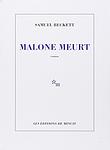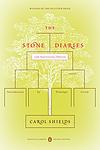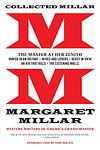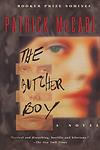The Greatest Nigerian, Canadian, Irish "Fiction" Books Since 1950
Click to learn how this list is calculated.
This list represents a comprehensive and trusted collection of the greatest books. Developed through a specialized algorithm, it brings together 300 'best of' book lists to form a definitive guide to the world's most acclaimed books. For those interested in how these books are chosen, additional details can be found on the rankings page.
Genres
Countries
Date Range
Reading Statistics
Click the button below to see how many of these books you've read!
Download
If you're interested in downloading this list as a CSV file for use in a spreadsheet application, you can easily do so by clicking the button below. Please note that to ensure a manageable file size and faster download, the CSV will include details for only the first 500 books.
Download-
1. Things Fall Apart by Chinua Achebe
This novel explores the life of Okonkwo, a respected warrior in the Umuofia clan of the Igbo tribe in Nigeria during the late 1800s. Okonkwo's world is disrupted by the arrival of European missionaries and the subsequent clash of cultures. The story examines the effects of colonialism on African societies, the clash between tradition and change, and the struggle between individual and society. Despite his efforts to resist the changes, Okonkwo's life, like his society, falls apart.
-
2. The Handmaid's Tale by Margaret Atwood
Set in a dystopian future, this novel presents a society where women are stripped of their rights and are classified into various roles based on their fertility and societal status. The protagonist is a handmaid, a class of women used solely for their reproductive capabilities by the ruling class. The story is a chilling exploration of the extreme end of misogyny, where women are reduced to their biological functions, and a critique of religious fundamentalism.
-
3. Waiting for Godot by Samuel Beckett
"Waiting for Godot" is a play that explores themes of existentialism, despair, and the human condition through the story of two characters, Vladimir and Estragon, who wait endlessly for a man named Godot, who never arrives. While they wait, they engage in a variety of discussions and encounter three other characters. The play is characterized by its minimalistic setting and lack of a traditional plot, leaving much to interpretation.
-
4. Molloy by Samuel Beckett
"Molloy" is a complex and enigmatic novel that follows the journey of its eponymous character, an elderly, disabled vagabond, who is tasked with finding and killing a certain person. The narrative is split into two parts: the first is told from Molloy's perspective as he navigates his way through a strange and often hostile world, while the second follows a detective named Moran who is assigned to find Molloy. The novel is renowned for its challenging narrative structure, its bleak and absurdist humor, and its profound exploration of themes such as identity, existence, and the human condition.
-
5. Neuromancer by William Gibson
In this groundbreaking cyberpunk novel, a washed-up computer hacker is hired by a mysterious employer to pull off the ultimate hack. As he navigates a dystopian future filled with artificial intelligence, corporate espionage, and virtual reality, he must confront his own past and the dark realities of the digital world. The narrative explores themes of technology, identity, and consciousness, pushing the boundaries of science fiction literature.
-
6. Malone Dies by Samuel Beckett
"Malone Dies" is a narrative that delves into the mind of an elderly man who lies in a decrepit room, slowly dying. Throughout the novel, the protagonist grapples with his impending demise, while reflecting on his past. He also creates characters and stories within his mind to cope with his solitude and despair. The novel, characterized by its stream-of-consciousness style and bleak outlook, is a profound exploration of the human condition, mortality, and the nature of existence.
-
7. The Third Policeman by Flann O'Brien
"The Third Policeman" is a darkly comedic and surreal novel about a nameless narrator who, after committing a murder to raise funds for his scholarly obsession with a bizarre pseudo-scientific theory, finds himself wandering in an eerie, nightmarish landscape. He encounters strange characters, including a pair of eccentric policemen who are obsessed with bicycles, and becomes embroiled in a series of increasingly absurd and ludicrous situations. The novel explores themes of existence, reality, and the nature of hell, with a twist ending that forces the reader to question everything they've read.
-
8. The Unnamable by Samuel Beckett
"The Unnamable" is a complex, stream-of-consciousness narrative that explores themes of existence, identity, and the nature of reality. The protagonist, who lacks a clear identity, is trapped in a void and continually questions his existence and reality. As he grapples with his own consciousness, he attempts to tell his story, but constantly doubts and revises it, creating a cyclical, fragmented narrative. The novel is known for its challenging, abstract prose and its exploration of existentialist themes.
-
9. The English Patient by Michael Ondaatje
"The English Patient" is a story of four diverse individuals brought together at an Italian villa during the final days of World War II. The narrative revolves around a severely burned man who can't remember his name or past, a young Canadian nurse who tends to him, a Sikh British Army sapper, and a Canadian thief. As they navigate their own traumas and losses, the past of the mysterious patient slowly unravels, revealing a tale of love, identity, and betrayal.
-
10. Life of Pi by Yann Martel
A young Indian boy named Pi Patel survives a shipwreck and finds himself adrift in the Pacific Ocean on a lifeboat with a Bengal tiger named Richard Parker. Over the course of 227 days, Pi uses his knowledge of animal behavior and survival skills to coexist with the tiger, ultimately leading to an unusual and deeply spiritual journey. The story explores themes of faith, survival, and the interpretation of reality.
-
11. Selected Stories of Alice Munro by Alice Munro
This collection of short stories offers a comprehensive view of the author's narrative talent, showcasing her ability to create complex characters and situations that reflect the human condition. Set in various locations, from small Canadian towns to exotic foreign locales, each story delves into the intricate relationships, personal struggles, and quiet triumphs of its characters. The author's writing is marked by her keen observation, psychological insight, and the ability to convey the extraordinary within the ordinary, making each story a unique exploration of life's complexities.
-
12. Half of a Yellow Sun by Chimamanda Ngozi Adichie
The novel is set in Nigeria during the Biafran War, exploring the impact of the conflict on the lives of its characters. The story is told from the perspective of three characters: a young houseboy, a radical university professor, and the professor's wealthy lover. The narrative delves into themes of love, race, and war, offering a vivid depiction of the horrors of conflict and the resilience of the human spirit.
-
13. The Famished Road by Ben Okri
The novel centers around the life of an abiku, a spirit child, who resides in the bustling city of Lagos. Despite numerous attempts to return to the spiritual world, the boy is tethered to the physical realm through the love of his mother. As he navigates through the political unrest and poverty of post-colonial Nigeria, he experiences a series of surreal and mystical encounters, all while wrestling with the pull of the spirit world. The narrative is a blend of reality and the supernatural, providing a unique perspective on the struggles and complexities of human life.
-
14. Arrow of God by Chinua Achebe
Set in Nigeria during the early 20th century, the story follows Ezeulu, the chief priest of the god Ulu, as he struggles to maintain his position of power in his village and with his own family. As the British colonial government seeks to exert control, Ezeulu finds himself caught between the traditional religious practices of his people and the new political realities. The narrative explores themes of power, tradition, change, and the clash of cultures.
-
15. The Country Girls by Edna O'Brien
"The Country Girls" is a coming-of-age novel about two young Irish women, Kate and Baba, who grow up in the restrictive and repressed atmosphere of rural Ireland in the 1950s. The narrative follows their journey from a convent school to the bright lights of Dublin, where they seek love and adventure. The novel explores themes of female friendship, sexual awakening, and the struggle for personal freedom against the backdrop of a conservative society.
-
16. Amongst Women by John McGahern
"Amongst Women" is a novel that tells the story of Michael Moran, a bitter, aging Irish Republican Army (IRA) veteran, and his relationships with his wife and five children. The narrative explores themes of family, power, love, and the struggle between freedom and control. Moran's domineering personality and the effects of his past experiences in the IRA have a profound impact on his family, shaping their lives and relationships in complex and often destructive ways.
-
17. Obasan by Joy Kogawa
The book is a semi-autobiographical novel that tells the story of a Japanese-Canadian woman named Naomi, who reflects on her experiences during World War II. As a child, Naomi was forced into internment along with thousands of other Japanese-Canadians, following the bombing of Pearl Harbor. The narrative explores the themes of racism, identity, silence, and the power of memory, as Naomi grapples with the trauma of her past and the impact of her cultural heritage on her present life.
-
18. The Blind Assassin by Margaret Atwood
The novel is a complex narrative that weaves together the story of two sisters in early 20th century Canada, one of whom publishes a scandalous novel that leads to her suicide. The surviving sister, now an elderly woman, reflects on their lives, revealing family secrets, heartbreak, and the truth behind the scandalous novel. The narrative is interspersed with excerpts from the controversial book, a science fiction story within a story, adding layers of intrigue and mystery.
-
19. Americanah by Chimamanda Ngozi Adichie
The novel follows a young Nigerian woman who emigrates to the United States for a university education. While there, she experiences racism and begins blogging about her experiences as an African woman in America. Meanwhile, her high school sweetheart faces his own struggles in England and Nigeria. The story is a powerful exploration of race, immigration, and the complex nature of identity, love, and belonging.
-
20. The Stone Diaries by Carol Shields
The novel follows the life of Daisy Goodwill Flett, a seemingly ordinary woman, from her birth in Canada in 1905 to her death. It explores her experiences as a mother, wife, and widow, as well as her work as a gardener and her later years as a columnist. The book is unique in that it is written in a variety of styles including letters, diary entries, and third-person narrative, and it explores themes of identity, love, and the often overlooked lives of women.
-
21. Beast In View by Margaret Millar
"Beast In View" by Margaret Millar is a gripping psychological thriller that follows the story of Helen Clarvoe, a troubled woman who becomes entangled in a web of deception and manipulation. When Helen receives a series of disturbing phone calls from an unknown caller, she becomes convinced that someone is out to destroy her life. As she desperately tries to uncover the identity of her tormentor, Helen finds herself questioning her own sanity and unraveling dark secrets from her past. With its intricate plot and complex characters, this suspenseful novel explores themes of obsession, betrayal, and the fragile nature of the human mind.
-
22. The Butcher Boy by Patrick McCabe
The Butcher Boy is a dark and disturbing tale set in small-town Ireland, following the life of a troubled young boy who descends into madness and violence. The protagonist's life is filled with neglect, abuse and mental health issues, and his increasingly erratic behavior and gruesome fantasies lead him down a path of horrific actions. The novel provides a stark exploration of the effects of societal neglect and the failure of mental health systems.
-
23. The Palm Wine Drinkard And His Dead Palm Wine Tapster In The Dead's Town by Amos Tutuola
This novel follows the surreal and fantastical journey of an African man with an insatiable thirst for palm wine, who, after the death of his skilled tapster, embarks on a quest to the land of the dead in hopes of bringing him back to the world of the living. Along the way, he encounters a myriad of bizarre and supernatural obstacles, including ghosts, witches, and other mythical creatures, each presenting their own challenges and moral lessons. The narrative, rich with the oral tradition of Nigerian folklore and written in a distinctive pidgin English, weaves a tale that explores themes of desire, loss, and the intersection of the living and the spiritual realms.
-
24. The Deptford Trilogy by Robertson Davies
"The Deptford Trilogy" is a series of interconnected novels that explore the life of a man from a small Canadian town named Deptford, and the ripple effects of a single childhood event that shaped the lives of three boys. The narrative weaves themes of love, guilt, art, and the complexity of human nature. The story is told from multiple perspectives and spans several decades, providing a deep exploration of the characters' psychological and spiritual development.
-
25. Lives of Girls and Women by Alice Munro
"Lives of Girls and Women" is a coming-of-age story about a young girl growing up in a small town in Canada during the 1940s. The novel explores the protagonist's journey towards self-discovery and understanding of the world around her. The protagonist grapples with societal expectations, familial relationships, and her own burgeoning sexuality, all while navigating the complexities of adolescence and the transition into adulthood. The book offers a profound exploration of the female experience, delving into themes of gender, identity, and the intricate dynamics of human relationships.
Reading Statistics
Click the button below to see how many of these books you've read!
Download
If you're interested in downloading this list as a CSV file for use in a spreadsheet application, you can easily do so by clicking the button below. Please note that to ensure a manageable file size and faster download, the CSV will include details for only the first 500 books.
Download























